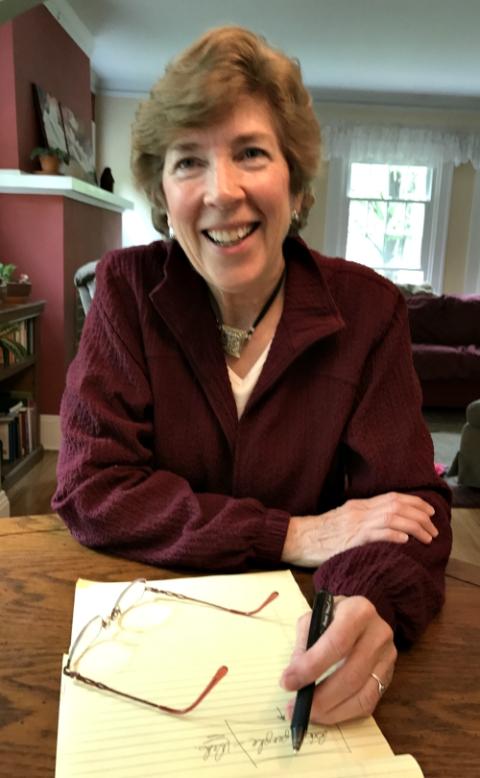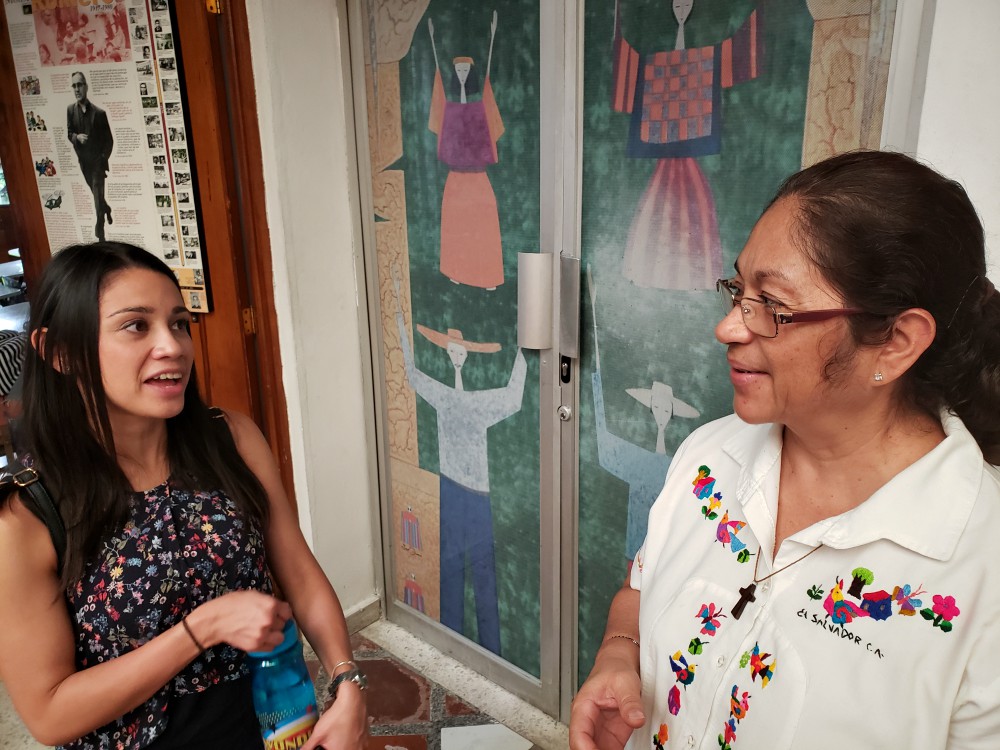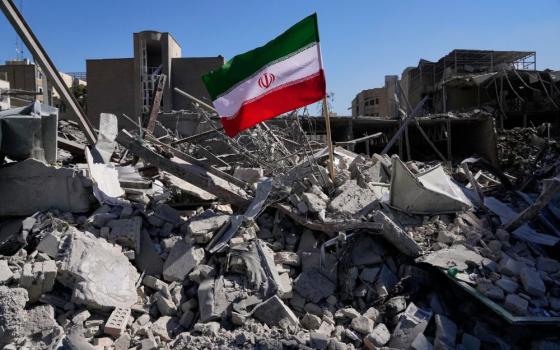
Sr. Irene O'Neill, president of Sisters Rising Worldwide (Courtesy of Sisters Rising Worldwide)
Sr. Irene O'Neill plunges into a discussion with characteristic passion.
"Imagine 700,000 women with a prophetic call of compassion, [who] chose to give their entire life to promoting peace and justice, know the root causes to the poverty around them, but cannot connect with each other," she asks.
From that declaration comes Sisters Rising Worldwide, a sister-run nonprofit based in St. Paul, Minnesota. The focus of the organization, formed in 2016, is to connect sisters "to each other and to resources for their ministry needs," as O'Neill said. "Resources include sharing best practices, strategic relationships or finances."
In July, the group's work will take a substantial step in achieving that goal when it unveils an online platform expanding the ability of sisters to connect to each other and access resources.
O'Neill, a member of the Congregation of the Sisters of St. Joseph, has headed the group since its founding. She was previously the executive director of the Sisters of St. Joseph of Carondelet Ministries Foundation, also in St. Paul. Other affiliations include being a member of the board of trustees of Avila University in Kansas City, Missouri, and chair of the of the Bethlehem University Foundation and a regent of Bethlehem University in Bethlehem, Palestine.
GSR: Many GSR readers may know a bit about Sisters Rising Worldwide but perhaps aren't sure what the nuts and bolts of the organization are. Can you explain those?
O'Neill: As I've traveled for work nationally and internationally, I've asked sisters, "What are you doing? What are you working on?" Everywhere, sisters are quick to name root causes to the poverty around them, and most often describe their huge responsibilities and investments in responding to symptoms of underlying problems.
I've met sisters working on projects that help groups of 500 to 1,000 women in their community or area. All the while, these sisters know that if they are able to focus on reducing or eradicating root causes, the entire village or region could flourish, and tens of thousands more could be helped. Another reality is that many sisters feel siloed in their work and don't always have a way to communicate out to the world for resource needs they may have.
About five years ago, I decided to focus my attention on whether or not a solution existed that could unite and help sisters on a global scale. I gathered a group of visionary sisters I knew, and together, we looked for answers to questions like: How do sisters and members among congregations connect? Are most congregations siloed? Do sisters from different congregations within the same region or country share resources? Who connects to whom, and why?
What did you learn?
We learned that many sisters are on Facebook and WhatsApp, but connections to other sisters depend on first knowing the other sister. We searched the technology landscape for a way to more broadly connect sisters and found none. Eventually, we realized an entirely new platform needed to be developed.
We wanted to be able to know where sisters are and what they do and to have that information available for the global sisterhood. The platform needed to be secure and enable sisters to sort by location and ministry. Sisters focusing on education or domestic violence, for example, would be able to share insights and best practices and offer support to one another. A sister in the Congo teaching job skills to women could chat with sisters who also are teaching job skills in Sri Lanka, El Salvador, Germany, Nigeria, Brazil, the U.S., for example. The local impact of sisters' work would emerge into a global reality of hope and compassion. This platform would be a game-changer not just for sisters, but illuminate a loving presence to all others, as well.
As only God would have it, just when we needed to take a big step forward to figure out how to go about developing a platform, Sr. Patty Johnson, a Sister of St. Joseph, called upon her incredibly talented family of cousins, the Mallons, to help us develop a wireframe that ultimately developed into our new, secure technology platform. This platform provides a hub that enables live communication between sisters around the world as well as allowing sisters to describe their work, send requests for resources and share impact. Sisters can sort information by country and category of service. As sisters register and begin to describe needs, Sisters Rising Worldwide will work to connect resources with these needs.
Do sisters want this?
Oh, yes. About two years ago, Sisters Rising Worldwide was invited to attend as observers at a Western Hemisphere anti-trafficking meeting in Cleveland, Ohio, sponsored by Talitha Kum. At the end of the agenda, sisters were asked to list what would be most helpful to them going forward. The group sorted out the top six most-desired points. We were ecstatic when we saw our mission validated in the six top needs.
Advertisement
What did the sisters most want? They wanted a database of membership; a way to share resources — information, best practices and financial support; articulate collaboration among networks; concretize collaboration among networks; address root causes of problems; and have access to research funding sources. Sisters really do want to go deep and get beyond just addressing symptoms.
Say more about the platform.
Once we had the wireframe developed, our next big hurdle was to find people willing to fund this enormous vision. And we found them, and some even found us: incredibly faith-filled, generous donors who deeply believe in sisters' work stepped up from around the country. We've named the platform Peace Room. It will be ready to roll out in July.
That platform is a private site, correct?
Peace Room is a secure, private site for sisters. We also have a public website: sistersrisingworldwide.org. The two sites are separate but linked. The public site is where donors learn about and support the work of sisters. Sisters seeking resources for their ministry will find a resource request form found in Peace Room. They can fill it out online and submit it to Sisters Rising Worldwide. Sisters are asked to describe their project's outcomes, objectives, numbers of people served and the root causes their project targets served.
Once sisters submit their proposal and it is accepted by Sisters Rising Worldwide, their request, along with photos, is moved to the public website. Crowdsourcing begins when a project is posted. The objective of crowdsourcing is to reach as many people as possible and invite them to help move the sisters' work forward through their online donation. With the help of social media specialists, all of us sharing on our own social media, the Sisters Rising website, and the donate button, we have the potential to connect with many more folks willing to support our sisters' work.
Do you think this will energize sisters?
A surge of strength and recommitment happens when sisters see what other sisters are doing. Imagine when we can see it in all parts of the world and know that there are people who want to support the work. We all feel much stronger knowing that we are not working alone — a feeling of, "We can do this."
Is there any concern that your work is somehow in competition with the sisters' congregations themselves?
No. We have made it clear that Sisters Rising Worldwide is a global gathering place for information about sisters' services across congregations. The application language is very clear: "When Sisters want to contact SRW for ministry resource help, they must first contact their own Congregational Leader and ask for a letter of support written on congregational stationery that includes the project name and Sisters involved. This letter is submitted along with the application."

Sr. Hilda Alfaro, right, a member of the Guardian Angel congregation, and Raquel Orellana, the San Salvador-based program leader for the Color Movement, a joint program of Alight and Sisters Rising Worldwide, on a visit to the home, now a museum, where Oscar Romero lived (Provided photo)
Your work is supported by partners like Alight, but you're also seeking funding from individuals, correct?
This has been a time when our partnering with Alight has been fantastic. [Alight, formerly the American Refugee Committee, is a Minneapolis-based humanitarian organization, and Alight and Sisters Rising Worldwide are co-sponsors of a sisters-focused project called the Color Movement in El Salvador.] We are partners but are separate organizations.
In El Salvador and elsewhere, Alight is working increasingly with sisters, who Alight sees as being on the front line of work. Working with Alight has been like a gift from God. We've been able to connect sisters with Alight for project work.
Here's an example: During this pandemic, Alight is offering sisters an opportunity to speak with medical doctors online; provide posters with WHO guidelines to distribute among their communities; and provide some funding to buy food, soap or material for masks for themselves and for those they serve.
Alight has also connected sisters to each other on WhatsApp or Zoom. They share phenomenal stories of tenderness and joy. And sisters say they feel stronger together and part of an enormous team.
The idea of crowdsourcing is something new, right?
Partnering with other organizations is one basis of financial support, but we're also looking for support from individuals, including younger people who may be persuaded to give up one latte a month and contribute $5 monthly — multiple donors who can provide smaller amounts that begin to add up. Younger people tend to be wary of institutions. But many even non-Catholics, feel a connection to sisters. Many of them feel, "I need to be around sisters."
We had support for one project that I am particularly proud of. We raised $23,500 to buy a van in India so that young women on their way to classes would have a safe way of transport and not face the threat of being trafficked.
The sisters in India explained that economic conditions in rural India led many people to migrate to cities in search of livelihood. There, young women are often exploited and tricked into being trafficked. The Sisters of St. Joseph offer free education and vocational training at St. Joseph's Community College to prepare young women for careers to escape poverty. Internships and student placements are a vital part of the educational preparation. The young women do not have funds for transportation to internships that are not near the college. The sisters wanted to keep the young women safe from being trafficked when walking the distance to their internship site. Buying a van was an easy and logical solution to a serious problem.
What keeps you alive to the spirit, particularly in these difficult times?
The ever-present illumination of the holy. I feel it in loving interactions: parents and children, both two- and four-legged; in pristine lands, clean water, farmers raising healthy crops, dandelions and bees; neighbors helping neighbors; and of course, meeting people who support the work of sisters. When the impulse to help others is love and becomes the basic currency we use between and among us, I am energized and feel like I can keep going forever.
[Chris Herlinger is GSR international correspondent. His email address is [email protected].]






